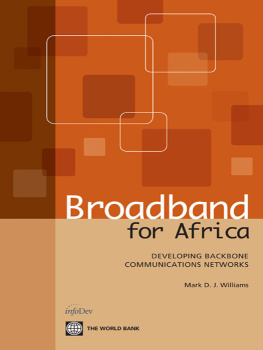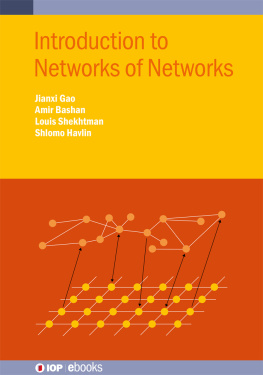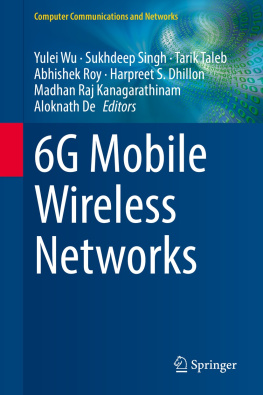Broadband for Africa
Broadband for Africa
DEVELOPING BACKBONE COMMUNICATIONS NETWORKS
Mark D. J. Williams

2010 The International Bank for Reconstruction and Development / The World Bank
1818 H Street, NW
Washington, DC 20433
Telephone: 202-473-1000
Internet: www.worldbank.org
E-mail:
All rights reserved
1 2 3 4 13 12 11 10
This volume is a product of the staff of the International Bank for Reconstruction and Development / The World Bank. The findings, interpretations, and conclusions expressed in this volume do not necessarily reflect the views of the Executive Directors of The World Bank or the governments they represent.
The World Bank does not guarantee the accuracy of the data included in this work. The boundaries, colors, denominations, and other information shown on any map in this work do not imply any judgement on the part of The World Bank concerning the legal status of any territory or the endorsement or acceptance of such boundaries.
Rights and Permissions
The material in this publication is copyrighted. Copying and/or transmitting portions or all of this work without permission may be a violation of applicable law. The International Bank for Reconstruction and Development / The World Bank encourages dissemination of its work and will normally grant permission to reproduce portions of the work promptly.
For permission to photocopy or reprint any part of this work, please send a request with complete information to the Copyright Clearance Center Inc., 222 Rosewood Drive, Danvers, MA 01923, USA; telephone: 978-750-8400; fax: 978-750-4470; Internet: www.copyright.com.
All other queries on rights and licenses, including subsidiary rights, should be addressed to the Office of the Publisher, The World Bank, 1818 H Street, NW, Washington, DC 20433, USA; fax: 202-522-2422; e-mail: .
ISBN: 978-0-8213-8172-4
eISBN: 978-0-8213-8173-1
DOI: 10.1596/978-0-8213-8172-4
Library of Congress Cataloging-in-Publication Data
Broadband for Africa: developing backbone communications networks / Mark D. J. Williams.
p. cm.
Includes bibliographical references and index.
ISBN 978-0-8213-8172-4 ISBN 978-0-8213-8173-1 (electronic)
1. TelecommunicationAfrica. 2. Broadband communication systemsAfrica. 3. Information technologyEconomic aspectsAfrica. I. Williams, Mark D. J., 1972
HE8464.B76 2009
384.33dc22 2009041805
Foreword
Over the past decade, a large amount of private investment, driven by sector liberalization and competition and major advances in cellular technology, has brought telecommunications services within the reach of the majority of Africas population. Increasing competition is making services more affordable and putting pressure on operating margins. Operators are responding by expanding their networks beyond towns and cities into rural areas, and tailoring services to the needs of the lower-income tiers of the population. This rapid spread of access to information and communications services is changing the way society and business work in Africa, allowing families to stay in touch with each other, governments to deliver services more effectively, and businesses to operate more efficiently.
Africas rapid adoption of the mobile phone is quickly closing the digital divide in voice services. But, just as one divide is closing, another one is opening wider. Consumers almost everywhere are demanding more services and larger bandwidth. People everywhere are coming to realize the benefits of having broadband Internet service, which permits instant access to nearly unlimited sources of information globally. The knowledge provided through such easy access to information is creating unprecedented opportunities and having a dramatic impact on the way people live and work. Africa, however, has been largely left behind in the shift to broadband. Increasing the availability and affordability of broadband services is thus high on the agenda for policy makers in Africa, though it will require major efforts from both government and the private sector. Conducive policy environments, investment in network infrastructure, access to radio spectrum, and availability of affordable international bandwidth will all play key roles in the delivery of low-cost broadband to Africa.
This book looks at one critical element of the broadband network infrastructure: domestic backbones. Backbone networks are the high-capacity, fiber-optic networks that link disparate geographic areas and transport the high volumes of communications traffic associated with broadband services to customers. Africas focus, thus far, on mobile networks to address an immediate service need has left backbone networks underdeveloped. This has created a major bottleneck in the rollout of high-bandwidth services and in the upgrading of cellular networks to provide value-added services. Overcoming this infrastructure hurdle is an important element in shaping the structure and policy framework of the telecommunications services sector. Without it, broadband will remain expensive and limited to businesses and high-income customers.
This volume takes a comprehensive, analytical view of the policy challenge of backbone networks, starting with the economics and the technology. It develops a set of policy recommendations for governments aiming to raise investment in and access to backbone networks, and lays the foundation for the World Banks strategy toward backbone communications infrastructure in Africa.
Mohsen A. Khalil
Director, Global Information and Communication Technologies
The World Bank Group
Acknowledgments
This book was made possible thanks to funding by the Information for Development Program (infoDev), which is a multidonor grant facility housed at the Global Information and Communication Technologies (GICT) Department of the World Bank Group.
The book has benefited from extensive input and comments from people within and outside the World Bank Group. These individuals include Mohsen A. Khalil (director, GICT), Philippe Dongier (manager, GICT), Valerie dCosta (manager, infoDev), Mavis Ampah (GICT), Laurent Besancon (GICT), Cecilia Briceo-Garmendia (Africa Region, Sustainable Development [AFTSN]), Amit Burman (Public-Private Infrastructure Advisory Facility), Jeffrey Delmon (Finance Economics and Urban Department [FEU]), Vivien Foster (AFTSN), Mike Jensen (independent consultant), Charles Kenny (FEU), Ioannis Kessides (Development Economics Research Group), Yongsoo Kim (GICT), and Juan Navas-Sabater (GICT).
Particular thanks go to Bjrn Wellenius (consultant, GICT) and Peter L. Smith (consultant, GICT), who have provided valuable insights and support throughout the study and have contributed tremendously to the writing of this book.
The World Bank Office of the Publisher was responsible for the design, editing, typesetting, proofreading, and indexing of this volume.
About the Author
Mark D. J. Williams is a senior economist in the Global Information and Communication Technologies Department of the World Bank Group, where he specializes in the economics and regulation of ICT. He has advised governments, regulatory authorities, and private companies around the world on policy and regulation in the telecommunications and postal industries. Recently he has been focusing on the design and implementation of public-private partnerships for ICT infrastructure, particularly backbone networks, in southern and eastern Africa. He regularly publishes articles in journals, speaks at conferences, and contributes to books on ICT in Africa.











